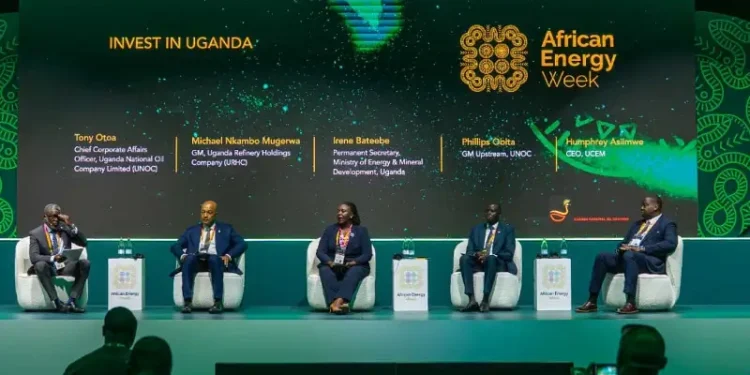Uganda’s long-awaited oil refinery is finally on the horizon. With construction beginning in late 2025, the $4 billion facility is poised to reshape East Africa’s energy future, reduce fuel imports, and strengthen Uganda’s economic independence.
The refinery, located in Kabaale, Hoima District, will begin operations between the fourth quarter of 2029 and the first quarter of 2030, confirmed Michael Nkambo Mugerwa, General Manager of Uganda Refinery Holding Company, during the Invest in Uganda panel at the African Energy Week (AEW) conference in Cape Town.
Major Energy Infrastructure Milestone
The project follows a 2025 agreement between the Uganda National Oil Company (UNOC) and UAE-based Alpha MBM Investments. It will process 60,000 barrels of crude oil daily, making it one of the region’s most advanced integrated refining facilities. UNOC will hold a 40% stake, while Alpha MBM will provide the remaining 60%.
“This project goes beyond fuel production,” Mugerwa said.
“We are capturing the full value chain — petrochemicals, kerosene, fertilizers, and gas processing.”
He added that the accompanying industrial park, estimated at $3–4 billion, could attract an additional $1–2 billion in investments, transforming Hoima into Uganda’s new industrial hub.
Regional Integration and Market Reach
The refinery will serve Uganda and neighboring countries, including Tanzania, Kenya, Rwanda, Burundi, and the Democratic Republic of the Congo (DRC). Products from the facility will complement the East African Crude Oil Pipeline (EACOP), a $4 billion export route connecting Uganda’s oil fields to Tanzania’s coast.
Project Metrics
| Aspect | Data Point/Context |
|---|---|
| Refinery Capacity | 60,000 barrels/day |
| Estimated Project Cost | $4 billion refinery, $3–4 billion industrial park |
| Construction Start | Late 2025 |
| Operations Begin | Q4 2029 – Q1 2030 |
| Direct Jobs | 8,000–10,000 (construction); 1,500+ permanent |
| Power Supply | 200 MW dedicated to park (~6% of national capacity) |
| Export Markets | Tanzania, Kenya, DRC, Rwanda, Burundi |
| Local Content | Minimum 30% of contracts for Ugandan firms |
Driving Local Growth and Industrialization
The refinery and industrial park are central to Uganda’s broader energy and industrialization strategy. According to Humphrey Asiimwe, CEO of the Uganda Chamber of Energy and Minerals, Uganda offers peace, security, a young population, and favorable investment conditions, including zero import tax on industrial equipment.
Permanent Secretary Irene Bateebe of the Ministry of Energy and Mineral Development confirmed that the government has committed $5 billion to expand power infrastructure to 10,000 MW, covering hydro, solar, and nuclear sources.
-
Uganda’s 60,000-barrel-per-day refinery will position East Africa as a regional energy hub.
-
Local firms are expected to receive at least 30% of project contracts, building national expertise.
Social and Economic Impacts
During the construction phase, the project is expected to generate up to 10,000 jobs, with around 1,500 permanent positions after completion. Secondary employment through the industrial park could support thousands more.
Uganda’s median age is 16.7, making this project a lifeline for youth employment and vocational development. Training programs in oil, gas, and engineering are already under way to ensure locals benefit directly from new opportunities.
Mugerwa emphasized that infrastructure for roads, water, and power is advancing, while 15 investors have already committed to the industrial park. These investments will help create a self-sustaining ecosystem around the refinery.
Policy and Regional Outlook
Past refinery initiatives (2013–2018) were delayed by financing challenges. However, the current public-private partnership model signals renewed investor confidence and aligns with the African Union’s call for in-continent value addition.
Uganda’s oil sector could increase national GDP by 1–2% annually post-2030, according to World Bank projections. Reduced dependency on imported fuels will help stabilize the country’s trade balance and mitigate exposure to global oil price volatility.
Transformative Future for East Africa
The Uganda refinery represents a turning point for East Africa’s energy independence. With integrated petrochemical production, modern power infrastructure, and a strong industrial base, Uganda aims to become a continental model for sustainable resource development.
As the refinery nears completion toward the end of the decade, its success will depend on effective management, environmental stewardship, and continued foreign investment.
Sources: African Energy Chamber, Uganda National Oil Company, and Uganda Ministry of Energy and Mineral Development.
Prepared by Ivan Alexander Golden, Founder of THX News™, an independent news organization delivering timely insights from global official sources. Combines AI-analyzed research with human-edited accuracy and context.









